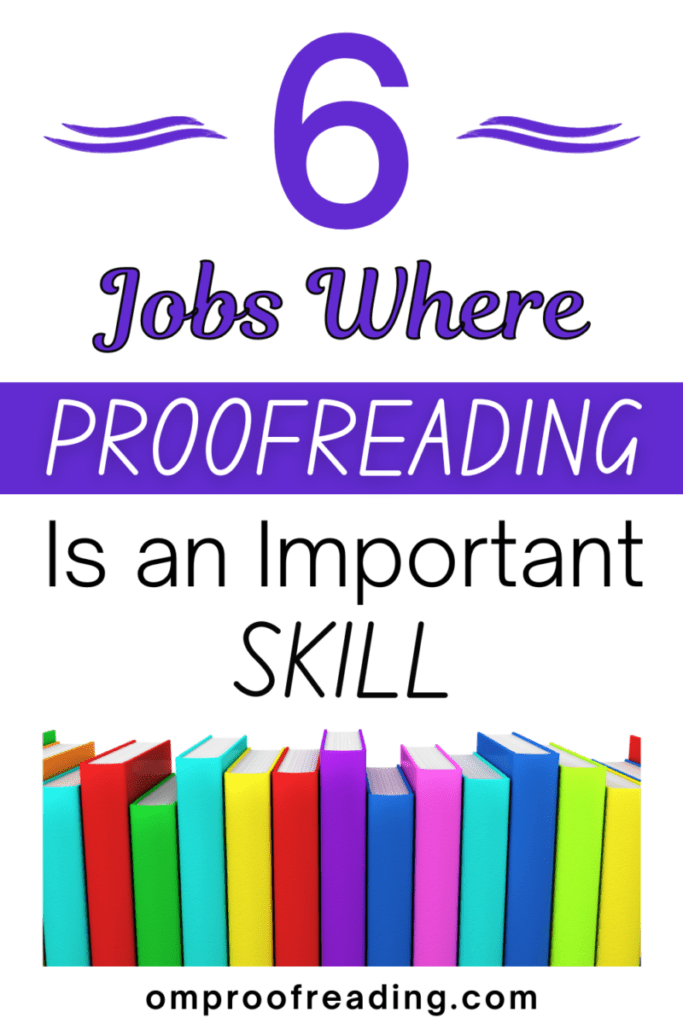This article may contain affiliate links. Please see our affiliate disclaimer in the footer menu for more information. Thank you for your support!

We all know what a big difference proper proofreading can make. Students who thoroughly proofread their essays and papers will likely receive better grades. Many grad school students hire professional proofreaders to revise their thesis, resulting in a more polished paper.
Proofreading is necessary for a wide variety of professions. We’ll look at six jobs where proofreading is a must-have skill. Although people in these professions frequently outsource some of the required proofreading, this doesn’t change the fact that proofreading plays an essential role in these jobs.
If you’d like to know precisely what proofreading entails, please check out this post on Om Proofreading.
Jobs Where Proofreading Is an Important Skill
1) Author
Proofread to get your manuscript published.
Authors have a better chance of obtaining a literary agent or publishing their manuscript if it has been carefully proofread before submission. It would be a shame to be rejected by an agent or a publisher because of punctuation pitfalls or grammar gaffes.
This would especially be a bummer if the author’s book had outstanding content but was held back by mistakes that could have been corrected.
Proofread to make the reading experience enjoyable.
Putting the final polish on a book makes it a much better experience for the readers.
I took some time to look through Amazon reviews for numerous books.
For many books that received mediocre reviews, people were quite vocal about how overlooked errors got in the way of them enjoying the story.
Some reviewers commented on how difficult it was to read a book containing many punctuation, grammar, and spelling mistakes.
Other reviewers voiced their discontent by pointing out how these errors interrupted the reading experience.
Still, others felt the mistakes threw them right out of the story.
Most people stated their comments tactfully, while others . . . well . . . um, they didn’t. Ouch!
Proofread to preserve the magic of books.
It’s a magical feeling to get lost in a book, but it isn’t so pleasant to be abruptly yanked out of the narrative by an annoying typo.
It’s like being in a deep, peaceful sleep and then having someone pour a cup of ice-cold water on your face. Okay, maybe it’s not that bad. Or is it? 😉
If authors want agents, publishers, and readers to look favorably upon their book, proofreading is a step that can’t be neglected.
2) Doctor

Proofread electronic health records to ensure patient safety.
Doctors do a lot of writing in their profession. They have to provide written documentation of numerous aspects of people’s health in electronic health records: medical histories, medications, diagnoses, progress notes, lab and test results, etc.
They also have to fill out insurance forms, draft referral letters, write prescriptions, compose emails, and the list goes on and on, and then I think it goes on even more. 😉
Of course, since this information affects one’s health and well-being, it needs to be checked carefully.
Proofread the work of medical transcriptionists for accuracy.
Many doctors dictate clinical notes using voice recognition software. A medical transcriptionist then types the notes that the physician dictated.
Due to background noise, a thick accent, speaking quickly, etc., these notes can contain errors. Also, various medical terms can be challenging for some transcriptionists to decipher.
Therefore, proofreading what has been dictated is a vital job the medical professional must perform before signing off on documents. Mistakes in these kinds of texts can range from distracting to dangerous.
Proofread for the correct placement of decimal points to guarantee proper dosages.
Another example of why proofreading is essential for physicians is when it comes to decimal point placement in a prescription. Making sure the decimal point is in the right place is an integral part of ensuring correct dosages.
Sometimes the nurses detect an error in a prescription when they perform a safety check before administering medication.
A safety check is like a proofread to help ensure the right dose of the right medicine is given to the right patient via the right route at the right time. 😊
Proofread to have your work published in a medical journal.
Finally, some doctors write about health for the general public, and many write about medicine for scholarly publications.
In his article “The Write Stuff: How Good Writing Can Enhance Patient Care and Professional Growth,” Harvey B. Simon, MD, notes that “sloppiness is a dagger in the heart of credibility.” Yes, the fact that sloppiness detracts from credibility is a painful truth—especially the way Dr. Simon describes it.
The article mentioned above was published in The American Journal of Medicine. Speaking of medical journals, one of the many reasons these journals reject a manuscript is because of too many spelling and grammar errors.
Too many mistakes mean the manuscript isn’t up to publishing standards.
3) Businessperson
Proofread to win over customers.

We tend to judge a company by the content it puts out.
For example, if a business’s website is full of grammar goofs and spelling snafus, how likely are you to purchase the products or services they offer? My guess is that you wouldn’t be overly eager to fork over your money.
If they can’t be bothered to produce quality website copy, will they be bothered to provide you with top-notch service?
Also, if their products are any reflection of their written work, you would think they may be inferior compared to what you could buy elsewhere.
Proofread to get your message across clearly.
With so many businesses competing for our attention, making a great first impression is a must. Companies need to be able to get their message across clearly and effectively.
If companies do their best work on the business documents they put out, they’ll probably also do their best work for clients.
Proofread to build relationships.
Businesses want to stand out for their innovative products and exceptional customer service, not because of glaring typos that give potential customers reason to believe they may be incompetent.
Having polished and professional content helps to establish trust and sets the foundation for solid customer relationships. It also increases customers’ likelihood of responding to a company’s call to action.
4) Lawyer
Lawyers write a lot. Whether it be a cease and desist letter, a contract, a petition, or some other document, most attorneys spend an enormous amount of time on paperwork.
Proofread to ensure intended meaning.
Unfortunately, documents with errors can tarnish a lawyer’s reputation. Legal texts must be worded carefully.
A misplaced word can lead to misunderstandings and unintended consequences.
Just putting a comma in the wrong spot can change the meaning of a sentence. Oh, the power of punctuation!
Also, certain words come up in legal texts that you don’t want to misspell. For example, it would be less than ideal to write pubic in place of public or statue instead of statute.
Furthermore, in an article published in the Marquette Law Review, Susie Salmon says, “Law firms record countless hours checking and perfecting the citations in their documents.” A lawyer’s professionalism can be questioned if these citations aren’t on point.
Proofread to inspire confidence in your clients.
Lawyers also need to produce polished copy so that their clients feel they’re responsible and trustworthy. When you hire an attorney, you’re hiring someone who has to pay close attention to details.
If attention to detail isn’t reflected in their written communication, that would give you reason for pause.
Finally, when a lawyer responds to a request for proposal, they must submit a clear and mistake-free proposal to have a shot at gaining a new client.
There’s no doubt that attention to detail inspires trust and conveys competence.
5) Professor/Teacher

Proofread your students’ work to help them become better writers.
For professors and teachers who instruct children old enough to write, proofreading students’ written work (papers, essays, poems, etc.) is one of the job requirements. Even in first grade, I was reminded that a sentence starts with a capital letter and ends with a period.
Although teaching students proper grammar, punctuation, and spelling is done primarily by a language arts teacher or an English professor, other teachers play a significant role in shaping a student’s ability to become an effective writer.
Proofread written communication to parents to guarantee clarity.
Even though I taught young children as a teacher, I still had a responsibility to my children’s parents concerning the written communication I provided to them.
As I mentioned on the About page of my website, when I needed parents to send a change of clothes for their child, I wanted to make sure I asked them for an extra T-shirt and pair of shorts instead of an extra T-shit and pair of shorts.
Just one missing letter or one misplaced punctuation mark can completely change the meaning of a sentence!
Proofread letters of recommendation to ensure a professional tone.
As teachers, we’re also tasked with writing letters of recommendation for our students. Believe it or not, I composed several letters of recommendation for children who were soon-to-be first graders.
How would it have reflected on the students (or our school) if my letters had been riddled with typos?
Properly proofreading letters of recommendation becomes even more critical when those letters represent a student trying to get into a particular college or university.
Proofread papers to be published in scholarly journals.
Finally, if you’re a professor writing an article to be published in a scholarly journal, proofreading your work is a must.
Laura Moss, the editor of a scholarly journal, wrote an article for Inside Higher Ed called “25 Ways to Increase Your Chances at Publication.”
She noted one of the comments she’s had to make in decision letters addressed to scholars: “This paper has too many typos and grammatical errors to go forward to peer review.”
6) Translator

Nowadays, more businesses want to market their products and services abroad. Thankfully, with an ever-growing number of translation services, the goal of crossing borders to grow one’s business has become a reality.
Proofread to preserve the meaning of the original document.
Translators choose their words carefully to retain the meaning of the original content.
A misused word or grammatical error that goes unchecked not only looks bad but can potentially change the intended message.
Translators are responsible for proofreading every translation they complete.
After a document is translated (and proofread by that same translator), it’s then proofread by another translator who knows the language of the original document and the new text. This allows another set of eyes to find and correct mistakes that could alter meaning.
Proofread to aid the readability of a text.
Texts that have been accurately translated and are free of mistakes are far more likely to be well-received by potential clients. Professional-looking documents help position a business for success and aid it in achieving its goal of expansion.
Of course, not all translated texts are for businesses. Documents can be translated to serve a myriad of purposes. However, a translation that’s as polished as possible will ultimately be easier to read and earn readers’ trust.
I hope this post has helped you learn about several professions in which proofreading skills are important.
Om Proofreading has an article about the skills professional proofreaders need, in case you’re thinking about becoming a proofreader.
If you’re curious about where professional proofreaders work, feel free to check out my post “Where Do Proofreaders Work? (Employees vs. Freelancers).”
Best wishes to you!
“Step into the fire of self-discovery. This fire will not burn you; it will only burn what you are not.”
– Mooji

Recent Posts
Punctuation is important because it enables us to communicate our message clearly and effectively. Without punctuation, we wouldn’t understand how units of a sentence relate to one another or how...
Although you're probably somewhat familiar with adverbs, you may be unaware of sentence adverbs. As a trained proofreader who has studied the parts of speech, I can help you understand this unique...
